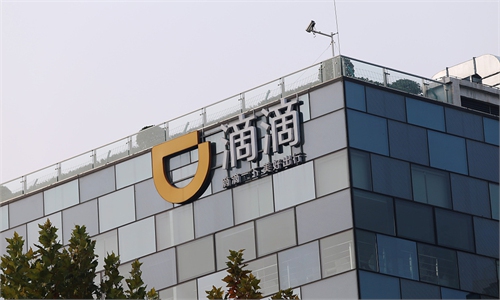
Full Truck Alliance Photo: VCG
China's cyberspace regulator on Monday announced that it was investigating job recruiting platform Boss Zhipin, and two truck-hailing apps under Full Truck Alliance, which are not allowed to register new users during the course of a cybersecurity review.The latest development came on the heels that Chinese regulator ordered app stores to remove ride-hailing app Didi Chuxing for download due to confirmed reports of "serious violations of law and regulation" in the collection and use of personal information.
Since the regulatory moves are expected to deal a blow to the three tech groups that listed in the US in June, speculation as to whether it is a signal of Chinese regulator's intention to crack down on US listings is rife within the market.
The timing may seem delicate given the recent US listings of the involved entities, but tightened regulation doesn't mean crackdown on overseas financing. The latest development only represents part of China's efforts to tighten regulation of its internet giants.
As the largest Chinese ride-hailing company, Didi Chuxing reportedly holds more than 80 percent of the car-hailing market in China, while Full Truck Alliance is also an industry leader in China's truck-hailing market. Such kind of tech giants have amassed a great deal of user information, and how such information is used or exploited is a matter of public safety. Safeguarding the information security is an essential part of strengthening supervision over these internet giants.
No country in the world would allow such influential data collectors to remain constantly off the radar screen. Therefore, there is a need for the government to conduct a security review of such data collectors, whether they are listed overseas or not. The actions taken against those internet giants show Chinese regulators' determination to strengthen the security of personal data, instead of an effort to crack down on overseas financing.
However, the advantages of overseas financing have begun to decrease. For China's digital giants, going public in the US may be just a financing option, which could be politically risky given the strained relationship between China and the US. In March, the US Securities and Exchange Commission (SEC) adopted the Holding Foreign Companies Accountable Act, a politicized legislation observers widely believed is a move targeting Chinese companies listing in the US. Companies listed in the US should disclose information in accordance with SEC requirements, so what do these information disclosure requirements mean to internet giants like Didi Chuxing?
By comparison, China's capital markets are experiencing rapid development, with up-to-date adjustments to listing requirements for internet companies, which have attracted the "homecoming" listing of some US-listed Chinese companies.
Under the current circumstances, caution is needed for internet companies when it comes to their listing choices. Should they decide to go public in the US, they are advised to do their homework and be prepared for greater scrutiny under both domestic and US regulations.

